
Last week, a $1.5bn development was announced for Flinders University’s Bedford Park campus that will see the creation of the biggest integrated education and health precinct in South Australia.
The massive development aims to bring 5,000 additional international students to Adelaide, improve student accommodation, increase annual education exports by $99m and see the creation of 10,000+ construction ‘job years’ during the development phase.
To Flinders’ Vice-Chancellor Professor Colin Stirling, the historic move is in lockstep with the University’s vision to create a vibrant campus experience that will be a magnet for students into the future.
“For all the opportunities that students have to study online, there is still a significant proportion of them who are looking for that social learning experience,” Professor Stirling told The Educator.
“It’s increasingly important that we can offer that into the future, so that’s where the campus development comes from.”
Professor Stirling said that due to the University’s location, it is not uncommon for people to drive past it rather than drop by and visit the campus to explore what it has to offer.
“This development will bring people on to the campus and make us an integral part of the community,” he said, adding that the University understands that education’s shift to 24/7 nature of learning requires new approaches, and new facilities.
“Life-long learning has been ‘the next big thing’ for as long as I’ve worked in universities, but it really is the next big thing.”
Professor Stirling said studies on this subject show that the half-life of skills is shortening, and that people will be returning to study for “short career-enhancing educational experiences” far more than has ever been the case.
“It’s almost education as a life-long subscription. While people might do a degree with us, they’ll come back, dip in from time to time to pick up something that enables them to make the next big move in their professional life,” he said.
“Most universities already have a large number of mature-aged students, but I think we’ll see this increasingly because people will come back for career-changing opportunities.”
Enabling cross-collaboration
Professor Stirling sees his job is metaphorically chopping down the wood so that the university’s colleagues can see the trees. This, he says, allows greater inter-disciplinary collaboration and harmony across the University’s campuses.
“If they can see there is a colleague and they can work with them easily because there’s nothing in the way of that, then they will,” he said.
“For example, we have an autonomous vehicle trial underway at the moment that is running out of our science and engineering college.
“There are people in the ICT space who are collaborating with colleagues in our law area because there are many legal implications and issues around autonomous vehicles and how they’re regulated.”
Professor Stirling said that because these colleagues are from different fields of expertise, they are far more able to address the big questions rather than the “tiny slice of discipline-specific areas” they’re looking at.
The biggest challenge ahead
Professor Stirling said the most significant challenge facing universities is how students will be adequately prepared for the future of work.
“We’re asking: ‘what is the skill set that we need to develop in our graduates so they can be successful in the future of work?’”
Professor Stirling said the pace of change means that the majority of graduates who leave university will be working in a job in 5-6 years’ time that doesn’t exist today.
“So, the challenge is: how do you train someone for a job that doesn’t exist?” he said.
“The key is that we need to teach people to think critically and teach them how to learn, which is a very important skill in itself, but we also have to help them to develop their creativity.”
Professor Stirling said these skills are timeless and will enable people to succeed, irrespective of what they might face in the future.
‘Universities will remain competitive’
Another key challenge for universities, says Professor Stirling, is combating the perception that universities are becoming less relevant because the Internet has made information omnipresent.
“There are a lot of different providers out there telling the world that there’s a different way to be educated, and that you can get all the information you need off your smartphone, but the most important thing we need to teach people is how to ask un-Googleable questions,” he said.
He said un-Googleable questions are where a person knows several things and “uses the known to ask the question of the unknown”.
“That is what universities do every day. We call it research, and we’re very good at it,” Professor Stirling said.
“Our researchers are skilled at taking the known facts, assimilating them and asking a question to which the answer is not yet known.”
He said this makes universities a great environment for students to learn that skill.
“We’ve always said that we offer research-led education, but I’d question whether we’ve actually done it as well as we ought to do it,” Professor Stirling said.
Professor Stirling said now is the time universities have to deliver on this into the future and make sure their graduates leave with these critical skills.
“While they won’t do research in the sense of wearing a white coat and working in a laboratory, that capacity to ask questions and to think about what you know and don’t know is an incredible skill that enables you to navigate almost every uncertainty, and that’s the way the world is going to be in the future,” he said.


